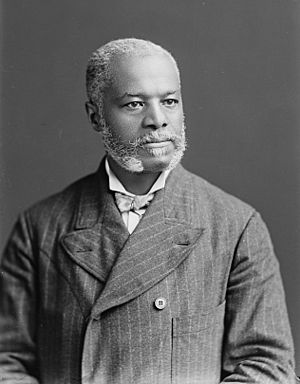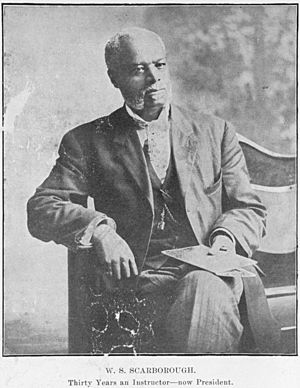William Sanders Scarborough facts for kids
Quick facts for kids
William S. Scarborough
|
|
|---|---|

Scarborough in 1903
|
|
| President of Wilberforce University | |
| In office 1908–1920 |
|
| Preceded by | Joshua H. Jones |
| Succeeded by | John A. Gregg |
| Personal details | |
| Born |
William Sanders Scarborough
February 16, 1852 Macon, Georgia, United States |
| Died | September 9, 1926 (aged 74) |
| Citizenship | United States of America |
| Spouse | Sarah Cordelia Bierce |
| Parents | Jesse Scarborough, Frances Gwynn Scarborough |
| Education | Lewis High School |
| Alma mater | Atlanta University Oberlin College |
| Occupation | professor |
William Sanders Scarborough (born February 16, 1852 – died September 9, 1926) was a very important African American scholar. He is known as the first African American expert in classical studies, which means he studied ancient Greek and Roman languages and cultures.
William Scarborough was born into slavery. Despite this, he became the president of Wilberforce University from 1908 to 1920. He also wrote a popular textbook about Classical Greek that many universities used in the 1800s.
Contents
William Scarborough's Early Life and Learning
William Scarborough was born in Macon, Georgia, in 1852. His parents were Jesse and Frances Scarborough. His father was a free railway worker, but his mother was enslaved. In those days, children inherited their mother's status, so William was born into slavery. His father had become free around 1846 but stayed in Georgia to be with his family.
Even though laws made it illegal to teach enslaved people, William learned secretly. By age 10, he knew how to read, write, do math, and understood geography and grammar. Because he was so well-educated, he became a shoemaker's helper and secretary for an important Black organization when he was still young.
After the American Civil War ended, William could finally finish his education. He went to Lewis High School in Macon. Then, in 1869, he attended Atlanta University for two years. Later, he went to Oberlin College, where he earned his degree in 1875. He also completed his degree at Atlanta University in 1876.
Starting His Career as a Teacher
After college, Scarborough went back to Lewis High School. He taught classical languages there. This is where he met Sarah Bierce, who was the principal and later became his wife. In 1876, people who wanted to cause harm burned down Lewis High School. The local fire department did not try to save it.
For a short time, Scarborough was the principal of the Payne Institute in Cokesbury, South Carolina. But he found that the racial environment in South Carolina was not welcoming. So, he went back to Oberlin to get his master's degree.
Leading Wilberforce University
In 1877, Scarborough became a professor at Wilberforce University in Wilberforce, Ohio. He taught in the classical department. In 1881, he married Sarah Bierce, who also became a teacher at Wilberforce.
Professor Scarborough wrote a very popular textbook called First Lessons in Greek in 1881. In the same year, he became the first postmaster in Wilberforce. He wrote another book, Birds of Aristophanes, in 1886.
Even though he was a respected scholar, Scarborough faced unfair treatment because of his race. In 1909, when he had just become president of Wilberforce, he was stopped from going to a meeting in Baltimore, Maryland. The hotel refused to serve dinner if he was there. His paper for the meeting had to be read by someone else.
However, in 1892, Scarborough gave a lecture about Plato at the University of Virginia. This was special because no other African Americans were allowed in that room, except as servants.
In 1908, William Scarborough became the President of Wilberforce University. He held this important job until 1920. Wilberforce University was one of the oldest colleges for African Americans. Scarborough was seen as one of the most important African American scholars of his time. He wrote many papers about education for Black people, along with his books on classical languages.
Later Years and Important Groups
In 1921, President Harding gave Scarborough a job in the United States Department of Agriculture. He worked there until he passed away. He was writing a book about his own life, but it was not published while he was alive.
Years later, a professor named Michele Ronnick found his unfinished book. She edited it, and it was published in 2005 as The Autobiography of William Sanders Scarborough: An American Journey From Slavery to Scholarship.
Scarborough also took part in the second Pan-African Congress meeting in London in 1921. This was a meeting of people from around the world who wanted to improve the lives of African people.
Important Groups He Joined
William Scarborough was the third African American to join the American Philological Association. He was also the first to join the Modern Language Association, which is a group for people who study languages. This group has even named a prize for new authors in his honor.
He was a member of many other groups, including the American Spelling Reform Association and the American Social Science Association. He was also a mason and a leader in his church. He gave many talks across the country and wrote often for newspapers and journals. In 1882, he received an honorary law degree from Liberia College.
On March 5, 1897, Scarborough attended a meeting to honor Frederick Douglass. This meeting led to the creation of the American Negro Academy. This was the first major group of African American scholars. They worked to challenge racist ideas, promote equal rights for Black people, and study the history of African American life. Scarborough played a big part in this group's early years.
His Books
- First Lessons in Greek (1881)
- Birds of Aristophanes (1886)
- Questions on Latin Grammar, with Appendix. (1887)
- The Autobiography of William Sanders Scarborough: An American Journey From Slavery to Scholarship (Published after his death)
 | Dorothy Vaughan |
 | Charles Henry Turner |
 | Hildrus Poindexter |
 | Henry Cecil McBay |


